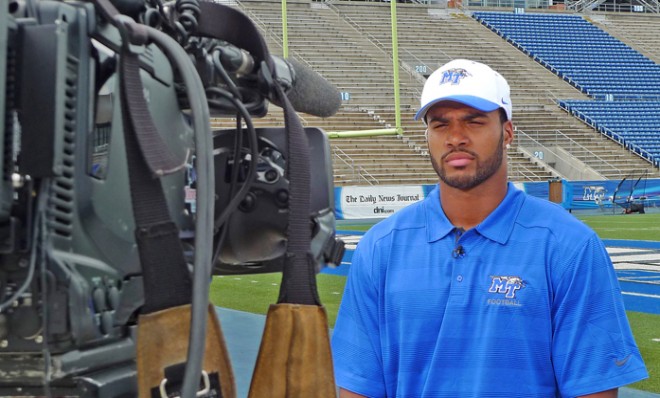Why the NCAA won't let a former Marine play football [Updated]
The NCAA's arcane, confounding bylaws strike again


A free daily email with the biggest news stories of the day – and the best features from TheWeek.com
You are now subscribed
Your newsletter sign-up was successful
Steven Rhodes spent the last five years in the Marines. His time there up, he returned to his native Tennessee this year to enroll in college and, he hoped, earn a spot on the football team.
One problem: The NCAA's byzantine rules wouldn't let him.
Rhodes, a 24-year-old freshman at Middle Tennessee State University and former sergeant in the Marine Corps, won a spot on the team as a walk-on. But as the Murfreesboro Daily News Journal first reported in an exhaustive profile Sunday, the NCAA barred him from competing this year because he played in a military-only recreational league while in the armed forces.
The Week
Escape your echo chamber. Get the facts behind the news, plus analysis from multiple perspectives.

Sign up for The Week's Free Newsletters
From our morning news briefing to a weekly Good News Newsletter, get the best of The Week delivered directly to your inbox.
From our morning news briefing to a weekly Good News Newsletter, get the best of The Week delivered directly to your inbox.
"This is extremely frustrating. I think it's unfair, highly unfair," Rhodes told the Daily News Journal. "I just got out of the Marine Corps, and I wanted to play. For [the NCAA] to say, 'No, you can't play right now,' I just don't understand the logic in that."
At issue is an NCAA bylaw that punishes student-athletes who did not immediately enroll in college after leaving high school. Such students are docked one year of athletic eligibility for every year they participated in "organized competition" while out of school. The bylaw, 14.2.3.2.1, also requires them to sit out at least one season after enrolling in college, a practice called "redshirting."
Rhodes graduated from high school in 2007, then worked for a year before joining the Marines. Though Rhodes says his military football league was "like intramurals for us" with irregularly scheduled games, the NCAA ruled it constituted "organized competition" because it had officials and uniforms. Oh, and because the teams kept score.
The NCAA initially ruled that Rhodes would lose two years of eligibility because his rec league games fell during two academic years — he played two games in the winter of 2011, and another ten or so in the summer and fall of 2012. MTSU successfully appealed that decision, but the NCAA still said Rhodes had to sit out for the upcoming season before being eligible to play next year.
A free daily email with the biggest news stories of the day – and the best features from TheWeek.com
The bylaw keeping Rhodes off the field used to include an exemption for former members of the military, but that was scrapped somewhere along the line when the NCAA revised the rule.
On Monday, two national politicians came to Rhodes' defense. Rep. Scott DesJarlais (R-Tenn.), whose district includes Murfreesboro and the MTSU campus, wrote to NCAA President Tom Emmert urging him to review the case, and saying the collegiate athletics body was "using an obtuse interpretation of its own bylaws" to bar Rhodes from playing.
"While I think we would both agree that this particular rule and clause therein was never intended to punish or deter our nation's military personnel from having the opportunity to participate in NCAA sanctioned athletic events, that is exactly the scenario that is currently unfolding," he wrote.
Sen. John McCain (R-Ariz.), himself a notable military veteran, also expressed his support for Rhodes.
The NCAA has said it is reviewing the case, but has yet to issue a final decision on Rhodes' eligibility.
"The NCAA has provided an initial review of the case and will continue to work with the university," NCAA spokeswoman Stacy Osburn said in a statement Monday. "The process is ongoing and a final decision has not yet been made."
Update: Late Monday, the NCAA announced it had decided to let Rhodes play this season after all, adding that Rhodes would also retain all four years of athletic eligibility.
"As a part of the ongoing review of NCAA rules, our members will examine the organized competition rules, especially as it impacts those returning from military service," Kevin Lennon, vice president of academic and membership affairs, said in a brief statement. "We thank Steven for his service to our country and wish him the best as he begins college."
Jon Terbush is an associate editor at TheWeek.com covering politics, sports, and other things he finds interesting. He has previously written for Talking Points Memo, Raw Story, and Business Insider.
